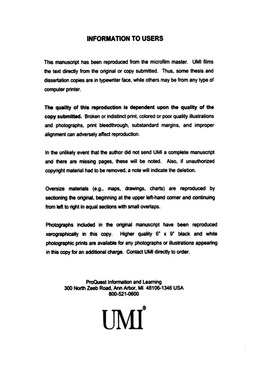| dc.contributor.advisor | Davis, Mary E., | en_US |
| dc.contributor.author | Lawler, Lois Kaye. | en_US |
| dc.date.accessioned | 2013-08-16T12:18:24Z | |
| dc.date.available | 2013-08-16T12:18:24Z | |
| dc.date.issued | 2001 | en_US |
| dc.identifier.uri | https://hdl.handle.net/11244/377 | |
| dc.description.abstract | Each of these works reframes historical truth from the context of its own geographic and temporal perspective by the deployment of revisionist narrative approaches. In the first chapter of this study the works are situated within the literary production of each of the authors, as well as within the context of the historical and cultural development of Latin-American gender relations. Chapter Two discusses Poniatowska's use of the testimonial narrative approach in order to examine the marginalization of subaltern classes in Mexican society from the feminine perspective of Jesusa Palancares, a twentieth-century domestic worker. In Chapter Three, Garcia Marquez's creative interpretation centers on Erendira as a non-traditional fairy tale protagonist whose emancipation from domestic and familial subjugation metaphorically deconstructs the mythological history of Latin-American imperial dominance. The focus of the fourth chapter is on Allende's use of the narratological elements of the literary anatomy and the symbolic properties of food as a framework for a feminine manifesto of sexuality that incorporates the author's own metafictional memoir of her development as a woman and writer. The final chapter of this study identifies the works analyzed as integral components of the literary development of revisionist approaches to traditional genres and the renewed interest in domestic motifs. | en_US |
| dc.description.abstract | The figurative movement of women from the private space of the home to the public forum gradually materialized in Latin-American literature over the course of the twentieth century. This particular literary transition substantially mirrored the progress of the feminist sociopolitical movement, in which women retained their affiliation with the home as an integral component of their identity, even as they sought to escape its confines. My investigation treats the utilization of the domestic sphere as a microcosmic model of dominance in Hasta no verte, Jesus mio by Elena Poniatowska, "La increible y triste historia de la candida Erendira" by Gabriel Garcia Marquez, and Afrodita: cuentos, recetas y otros afrodisiacos by Isabel Allende. Through the discursive portrayal of women as strong, resilient characters, and the home as an educative site, these works subvert the masculine representation of authority and reconfigure women as symbolically empowered forces of transformation. | en_US |
| dc.format.extent | viii, 226 leaves ; | en_US |
| dc.subject | Literature, Latin American. | en_US |
| dc.subject | Latin American literature Women authors History and criticism. | en_US |
| dc.subject | Literature, Modern. | en_US |
| dc.subject | Latin American literature 20th century History and criticism. | en_US |
| dc.title | Revisions of domesticity: Selected texts of Elena Poniatowska, Gabriel Garcia Marquez, and Isabel Allende. | en_US |
| dc.type | Thesis | en_US |
| dc.thesis.degree | Ph.D. | en_US |
| dc.thesis.degreeDiscipline | Department of Modern Languages, Literatures, and Linguistics | en_US |
| dc.note | Director: Mary E. Davis. | en_US |
| dc.note | Source: Dissertation Abstracts International, Volume: 62-10, Section: A, page: 3411. | en_US |
| ou.identifier | (UMI)AAI3028805 | en_US |
| ou.group | College of Arts and Sciences::Department of Modern Languages, Literatures, and Linguistics | |
